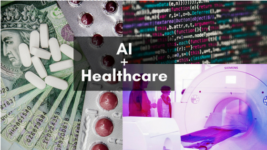Quality healthcare requires a standard of precision that not only helps patients but, also, facilitates trust and increased confidence between patients and their doctors. To effectively achieve this, physicians rely on tacit knowledge, experience and judgement — often, though, this isn’t enough.
Enter artificial intelligence (AI). By 2022, half of all hospitals plan to integrate AI, and more than one in three providers in the next 12 months. Between data science and business intelligence, healthcare is the third most common application for this emerging technology. Through data analysis, cognitive automation and machine learning it’s possible to record symptoms based on different parameters, structuring them instantly and anticipating patients’ behavior and ongoing needs.
It’s a powerful process that integrates cognitive automation learning, bringing together machine learning, and capabilities such as data capture, quality control, and algorithm training, to automate decisions around complex information. WorkFusion Intelligence Automation provides similar solution, which automates data collection like claims handling, audit and validation process in order to reduce time and communication gap between patient, provider and payer.
The volume and variability of information in healthcare make it a prime industry for AI. Any business might receive thousands of inquiries from customers a day, and as complexity in healthcare rises, it is because more problematic for businesses to handle these inquiries and the related documentation with people alone. The risk is always there when we talk about AI in the healthcare industry. At the same time, we believe that it can be a boon for tomorrow.
Document processing, claims handling, doctors and patient’s time and stress will reduce and effectiveness of the healthcare system will increase if medical professionals and AI solutions work hand in hand. AI application in healthcare, medicine and biotechnology includes supporting systems to identify genetic risks from large-scale genomic studies, predicting the safety and efficacy of newly launched drugs, providing decision support for medical assessments and prescriptions and tailoring drug administration to the individual patient.
One report revealed that medical errors were the third leading cause of death in the United States.1 Other countries also face the same problem, whether it can be machine errors, human errors or diagnosis errors. Healthcare payers and providers struggle to process claims and appeals. Eventually, the patient has to suffer either one way or another. While, health information technology, based on AI support better clinical decisioning at the point of care, where risk of errors can be reduced.
One of the most basic yet efficient use cases of AI-based treatment is to optimize the clinical process. Traditionally, the doctor asks many questions to a patient, diagnose and provide prescriptions even though the doctor do not know exact remedies. Like, trial and error formula. Now, AI-based mobile application helps the patient to self-diagnosis for basic health care. The application suggests remedies according to the revealed symptoms by user, it also provides information about what cares user should take in order to improve immunity power so in future user do not suffer from the same problem. These smart technology records all user data and if required it suggests when a user should visit the particular physician. Not only this, AI-powered application lets user communicate live with their physicians, which solve almost all basic level healthcare requirements. Overall, AI assistants can cover a large portion of clinical and outpatient services and the doctor becomes free to attend more critical cases.
Integration of AI in healthcare makes process error less which improves life expectancy of human. Less human interaction and more sophisticated medical instruments reduce the cost upto minimum level. Which also fasten the process and recover time. These are the most notable benefits of AI-Based Healthcare. One can achieve so many different fruits from one tree, then why don’t we support and turn towards AI based Healthcare.
- Makary MA, Daniel M. Medical error-the third leading cause of death in the US. BMJ. 2016;353(i2139).
Shruti Gupta is a writer, digital marketer and outreaching expert .She writes about technology, startups & other niches. She has contributed to a number of famous websites like Thenextweb, Deccanchronicle and Crazyegg.








